
Section 6. United Nations and its specialized agencies
6.1. General Assembly
General Assembly (GA) occupies a central position as the chief deliberative organ of the United Nations. It is comprised of all Members of the United Nations, each having one vote. It is authorized to discuss full spectrum of issues covered by the Charter. The UNGA convenes on September each year.
The 78th Session of the UN General Assembly themed "Rebuilding trust and reigniting global solidarity: Accelerating action on the 2030 Agenda and its Sustainable Development Goals towards peace, prosperity, progress and sustainability for all" was opened under the chairmanship of Dennis Francis, Trinidad and Tobago, in New-York on 19 September.
The UNGA High-level week comprised seven summits that adopted four political declarations on universal health, pandemic preparedness, fight against tuberculosis, and accelerating actions for achieving the SDGs. The 2023 SDG Summit marked the beginning of a new phase of accelerated progress towards the Sustainable Development Goals (September 18–19).
Statements from Central Asia countries at the general debate of the UNGA 78th Session

Statement by the President of the Republic of Kazakhstan
"Diplomacy and dialogue should always prevail in seeking the resolution of international disputes. We must therefore together exert the greatest efforts to stabilize the only system of global institutions we have"
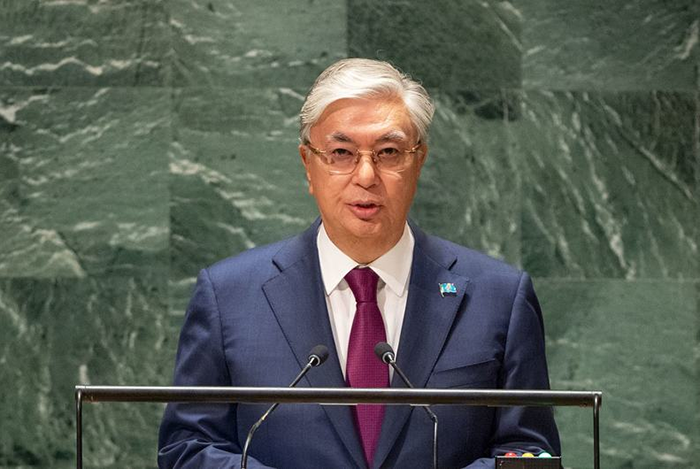
Security Council reform. H.E. Tokayev stressed the need to stabilize the system of global institutions, underlining that the world will not succeed in tackling these challenges without a comprehensive reform of the Security Council. He further emphasized that "the voices of middle Powers and all developing countries need to be amplified and clearly heard". Since the Council appears unable to move beyond deadlock, it should become more representative so other countries, including Kazakhstan, can play a greater role in maintaining peace and security.
Climate change. "…Even if we successfully limit global temperature rise to 1.5 degrees by 2030 – which looks increasingly unlikely – we will experience between 2 and 2.5 degrees of temperature rise in Central Asia. Despite the long road of the Paris Climate Agreement, we must all remain committed to a carbon-free future. The climate agenda should not be used to introduce measures restricting trade and investment cooperation. Instead we must focus on positive change, such as Climate-Positive Actions identified by the United Nations including investing in green jobs, ending fossil fuel subsidies, and ensuring that all climate actions are fair, inclusive, and involve women at all levels." The Head of Kazakhstan also noted that without proper funding, however, ambitious plans will remain unmet.
He proposed to launch Just Energy Transition Partnership in Kazakhstan. A gradual, sustainable, and socially responsible transition away from coal would be a big bonus for global climate change goals. Kazakhstan’s initiative to open the Project Office for Central Asia on Climate Change and Green Energy in Almaty can lead on these issues. Kazakhstan looks forward to hosting a Regional Climate Summit in Kazakhstan in 2026 under UN auspices.
Water. The President underlined in his statement that water scarcity in CA has created serious economic and other challenges in transboundary river basins. This will be replicated across the world: by 2040 global demand for water may outstrip supply by as much as 40%. "…We must therefore combine political will and economic resources to address this critical global issue simultaneous with climate action. Next year, we will assume chairmanship of the International Fund for Saving the Aral Sea. We will continue efforts to prevent further degradation of the environment and its impact on livelihoods around what was once the fourth largest lake on the planet. Today it is the world’s largest lake – the Caspian Sea – that also faces ecological challenges including shallowing, water diversion, and the pollution of flora and fauna. Saving the Caspian Sea must be a matter of common priority that requires long-term international cooperation."
Food security and Trans-Caspian International Transport Route. The President also raised the issue of global food security. Particularly, Kazakhstan is ready to act as a regional food supply hub. "We have all the required resources, infrastructure and logistics in place for these purposes. Kazakhstan is already a reliable link for nearly 80% of overland transit traffic between Asia and Europe." He also addressed the idea of Trans-Caspian International Transport Route, the so called "Middle Corridor", which can significantly strengthen East-West engagement and increase the pace of trade between critical markets.

Statement by the President of the Kyrgyz Republic
"Kyrgyzstan supports the UN as the only universal, intergovernmental, international Organization mandated by all Member States to find solutions to the challenges that constantly arise"
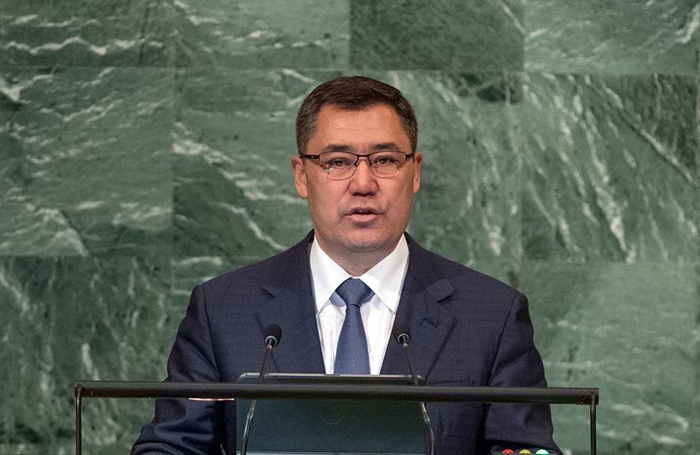
Cooperation among the Central Asian countries. " Strengthening relations with the countries of the region is a natural top priority for our country", emphasized Kyrgyz President, noting that in recent years "regional cooperation in Central Asia has been developing consistently and in all directions." President Zhaparov envisions CA as a single geo-economic space, a "geopolitical intermediary" for the international community. On the path to full regional integration, it is necessary to resolve issues related to the legal delineation of state borders. The President highlighted that after almost 30 years of negotiations, Kyrgyzstan and Uzbekistan signed an Agreement with on the legal delineation of the state border. "We want to live in peace, harmony, and friendship with all our neighbors", President Zhaparov underscored.
SDGs. President Zhaparov noted in his speech that the concluded SDG Summit once again reaffirmed the importance of unwavering commitment to sustainable development, identifying challenges in their implementation, and outlining specific commitments by states. "We are halfway to 2030, the deadline for reaching Sustainable Development Goals (SDGs). Kyrgyzstan, in its pursuit of achieving SDGs currently ranks 45th out of 166 UN Member States. We aim to be among the top 30 countries in reaching SDGs by 2030. The international community must breathe new life into these goals and strengthen solidarity in their attainment. It's important that we don't get lost in numbers, schedules, diagrams, and other 'economic intricacies,' because the essence and core of the 17 Goals are about people themselves."
Financing climate actions. As President Zhaparov said, the level of annual funding announced in 2015 under the Paris Agreement is no longer sufficient today and should be increased. "Another problem is that most climate finance is provided to low and middle-income countries in the form of loans", he noted and informed that he addressed partners with a request to exchange external debt for environmental projects but received no reaction from many of the developed countries. "Government of Germany was the only country that wrote off 15 million euros of debt", added Kyrgyzstan’s leader.
Glaciers. "In light of global climate change, mountainous regions have been particularly vulnerable. In Kyrgyzstan, mountains occupy about 94% of the territory. Mountain glaciers are an integral part of the Earth’s cryosphere, influencing not only the climate of our planet but also providing a habitat for flora and fauna and supplying water to people. Climate change in Central Asia has led to intensive melting of glaciers. If earlier it was predicted that by 2050 the area of glaciers in Kyrgyzstan would be reduced by half, and by 2100 they could disappear altogether, now there is reason to believe that this will happen much faster. This leads to aggravation of problems throughout the region: such as lack of water for drinking and agriculture, land degradation, and a threat to food security", President Zhaparov warned calling the international community to unite efforts to overcome these and other challenges.
"As you may know, in 2022, at the initiative of our country and the Italian Republic, the United Nations General Assembly unanimously adopted the resolution on 'Sustainable Mountain Development' co-sponsored by 110 Member States. This document declared the years from 2023–2027 as Five Years of Action for the Development of Mountain Regions." "A national 'Roadmap' for the implementation of the 'Five-Year Period of Action for the Development of Mountain Regions for 2023-2027' has been developed, which will be adopted shortly. The 'Roadmap' includes measures at the global, regional, and national levels, including within the framework of existing and prospective projects and measures related to the Sustainable Development Goals. As the concluding stage of the "Five-Year Action", we plan to host the Second Global Mountain Summit "Bishkek+25", in Kyrgyzstan in 2027, 25 years after the First Summit", announced Kyrgyz President and invited everyone "to actively participate and make concrete commitments to preserve mountain ecosystems."

Statement by the President of the Republic of Tajikistan
"Tajikistan is considered one of the world’s most vulnerable countries to climate change’s impact"
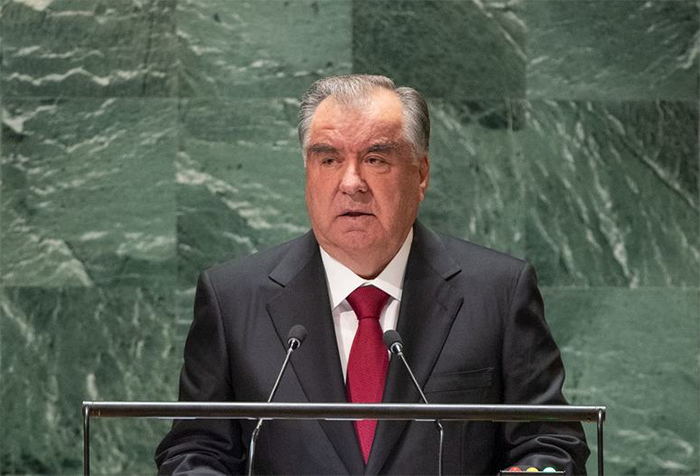
Climate-related disasters. Most of his speech, President Rahmon dedicated to climate change issues. Tajikistan actively supports UN mitigation programs and puts forward its own initiatives in this area.
With more than 13,000 glaciers, 60 per cent of water resources in Central Asia emanate from Tajikistan. Nevertheless, more than 1,000 glaciers have melted — this will have significant implications for the food security, water availability and ecosystems of the region and beyond, he warned. "The intense melting of glaciers as the primary source of freshwater requires the adoption of concrete measures, including research, data collection and processing, and enhanced international cooperation. I express my gratitude to all Member States for their cooperation in adopting the UNGA Resolution 77/158 from 14 December 2022 on International Year of Glaciers’ Preservation, 2025. I invite all interested parties to join efforts to ensure the targeted implementation of this Resolution. We stand ready to work with the international community within the newly created Group of Friends of Glaciers and beyond to implement the mandates of the Resolution. Tajikistan is convinced that this initiative will give a powerful impetus to a new global movement to take necessary collective action and to protect glaciers from intense melting. I would also like to highlight the successful outcomes of the United Nations Conference on the Midterm Comprehensive Review of the Implementation of the Objectives of the International Decade for Action, "Water for Sustainable Development’, 2018-2028." He noted that Dushanbe will host the Third High-Level Conference on the Implementation of the Decade of Action "Water for Sustainable Development" in 2024 and the International Conference on Glaciers’ Preservation in 2025. "We expect the international community to take an active part in these important international events. As a proactive and champion country in the global water and climate agenda, Tajikistan will continue to strive to promote cooperation between countries and organizations", stated Emomali Rahmon.
Regional solidarity. The Tajik leader noted successful cooperation among the countries in the region that creates favorable conditions for addressing current challenges, promoting peace and responding effectively to emergencies. In this context, he also noted a difficult political and economic situation in Afghanistan that is affecting the region as a whole. Emomali Rahmon stated that Tajikistan created conditions to continue providing humanitarian assistance and its infrastructure to support the Afghan people and appealed to the international community to increase the volume of humanitarian aid to the suffering people of Afghanistan.

Statement by the President of Turkmenistan
"... it is time for the UN to pay more attention to ecological problems in Central Asia. There is a need for proactive consideration of implementing concrete measures to create an all-inclusive environmental strategy for our region..."
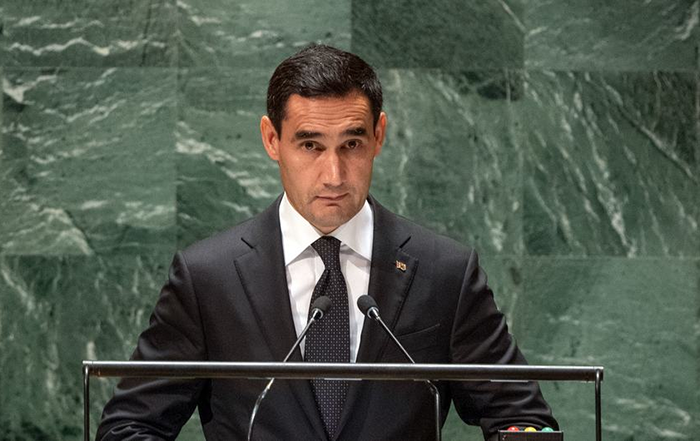
UN’s role. The President of Turkmenistan proposed to start discussing the possibilities of preparing a Global Security Strategy based on the principles of the UN Charter and universally recognized norms of international law and reflecting the presence of recently emerged new risk factors.
Climate change. "Turkmenistan considers that the solution of urgent climate and environmental problems will be among the key areas of UN activity for the coming years, especially the issues related to global methane commitments. I must say that after joining the Paris Climate Agreement in 2017, a number of relevant national programs were adopted in our country to reduce and eliminate the negative impact of methane emissions. First and foremost, we are talking about a step-by-step transition to modern, climate-friendly, and resource-saving technologies, especially in the fields of energy, industry, and transport." "As an important step in adopting a strategic approach to environmental problems in Central Asia, Turkmenistan proposes to establish a specialized agency, the Regional Center for Climate Change Technologies in Central Asia, which will work on climate issues in a substantive and systematic way. We are ready to provide the organizational and technical conditions for the functioning of such a Center in Ashgabat, the capital of Turkmenistan."
Caspian ecology initiative. President Berdimuhamedov recalled the confirmation by all participants of the Sixth Caspian Summit in Turkmenistan last summer of their readiness for close cooperation on ecological issues. "I believe that this creates good opportunities for the start of a broadbased and systemic interaction of coastal countries with the UN", stated Serdar Berdimuhamedov, proposing to establish the Caspian Ecology Initiative in close cooperation with the UN. It "could become an international platform for productive and professional interaction on a wide range of issues related to the protection of the Caspian Sea and its biological resources."

Statement by the President of the Republic of Uzbekistan
"...transforming Central Asia into a peaceful and prosperous region will remain a priority goal of Uzbekistan's foreign policy"
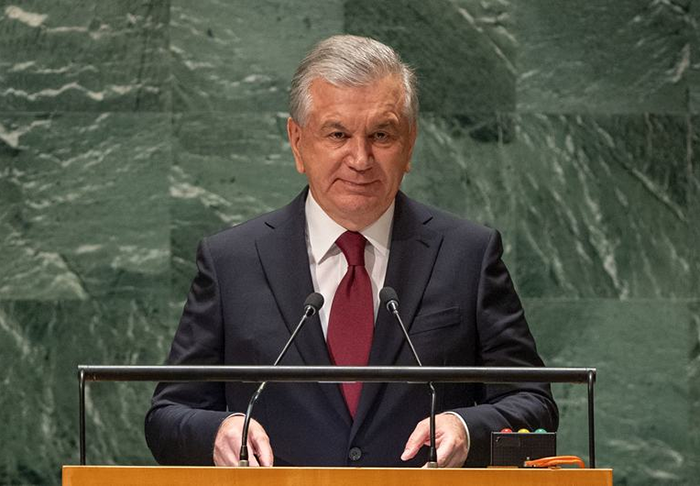
Unity of international community. On the background of numerous crises that the world currently faces, the Uzbek leader called on countries to unite their efforts bearing in mind that common interests should be placed above existing conflicts. He recalled the Samarkand Solidarity Initiative aimed at common security and development. "Our main goal is to comprehensively understand the responsibility for the present and future of our countries and peoples and to engage in a global dialogue all parties that are ready for open and constructive cooperation."
Climate change. "Currently, the world is facing a critical environmental situation. The triple planetary crisis - crises of the climate change, the loss of biodiversity and the environmental contamination are worsening. In such challenging conditions, while Central Asia continues to grapple with the Aral Sea tragedy, the region is becoming one of the most vulnerable parts of the world in the face of climate change. Uzbekistan is doing its best to mitigate the consequences of the Aral Sea tragedy, which remains a global problem. In recent years, 1.7 million hectares of green areas with drought tolerant plants had been created on the dried up bed of the Aral Sea. The support of the international community is essential for us to continue these efforts."
Over the next thirty years, the air temperature in the region has increased by one and a half degrees. If this tendency continues, the flow of the two major rivers in the region - Amu Darya and Syr Darya - may decrease by 15% in the next twenty years. It is expected that per capita water supply will decrease by 25% and agricultural yields - by 40%, warned President Mirziyoyev. " Given this context, we support the establishment of the position of the Special Representative of the UN Secretary General for Water Resources. We are in favor of attracting and introducing the state-of-art technologies in the process of establishing a Water Saving Technologies Platform in Central Asia, using the UN-Water mechanism. We are building up a systematic cooperation as part of the Green Development Program adopted by the counties of the region. Such a partnership completely meets our interest and is aimed at preventing threats related to climate change. In this context, I believe that the introduction of the Central Asian Climate Dialogue would be expedient."
Selected Resolutions on Water, Environment and Development Adopted by the UNGA 78th Session:
Disaster risk reduction (A/78/152); Protection of global climate for present and future generations of humankind (A/78/153); United Nations Decade on Combating Sand and Dust Storms, (2025–2034) (А/RES/78/314); Combating sand and dust storms (А/78/158); Sustainable, safe and universal water, sanitation, hygiene, waste and electricity services in health-care facilities (A/RES/78/130); Agreement under the United Nations Convention on the Law of the Sea on the Conservation and Sustainable Use of Marine Biological Diversity of Areas beyond National Jurisdiction (А/78/272); The human rights to safe drinking water and sanitation (А/RES/78/206); Eradicating rural poverty to implement the 2030 Agenda for Sustainable Development (А/78/165); Science, technology and innovation for sustainable development (А/RES/78/160); Implementation of the United Nations Convention to Combat Desertification in Those Countries Experiencing Serious Drought and/or Desertification, Particularly in Africa (А/78/154); Agriculture development, food security and nutrition (А/RES/78/168); Implementation of the Convention on Biological Diversity and its contribution to sustainable development (A/RES/78/155); Central Asia facing environmental challenges: fostering regional solidarity for sustainable development and prosperity (A/RES/78/147); Agricultural technology for sustainable development (A/RES/78/144); Sustainable development: International cooperation and coordination for the human and ecological rehabilitation and economic development of the Semipalatinsk region of Kazakhstan (A/RES/78/142); Information and communications technologies for sustainable development (A/RES/78/132).
2023 Conference on the Midterm Comprehensive Review of the Implementation of the Objectives of the International Decade for Action, "Water for Sustainable Development", 2018-2028
UNGA by its resolution (A/RES/73/226) decided to convene, in New York, from 22 to 24 March 2023, coinciding with World Water Day, the United Nations Conference on the Midterm Comprehensive Review of the Implementation of the Objectives of the International Decade for Action, "Water for Sustainable Development", 2018–2028.
UN Water Conference 2023 is a second over almost 50 years water conference organized by the UN to catalyze joint and concerted actions to tackle global water challenges and accelerate progress on SDG6 (Ensure availability and sustainable management of water and sanitation for all).
The Conference, co-hosted by the Governments of Tajikistan and the Netherlands, featured plenary meetings, a number of high-level special events, interactive dialogues, and over 500 side events. The Conference brought together around 10,000 participants - heads of state and government, official UN member country delegations, representatives of 100 regional and international organizations, civil society, business leaders, youth, academia, and stakeholders from a number of sectors. Central Asia was represented by delegation from all five countries.
The conference concluded with generation of over 700 commitments by governments and stakeholders towards accelerating progress for the second half of the International Decade for Action and the 2030 Agenda for Sustainable Development, including the appointment of a Special Envoy on Water and a new political momentum to achieve SDG6.
The CA countries have made a joint statement, by which they committed to further strengthening regional cooperation to achieve sustainable development and made a number of obligations at regional and national levels.